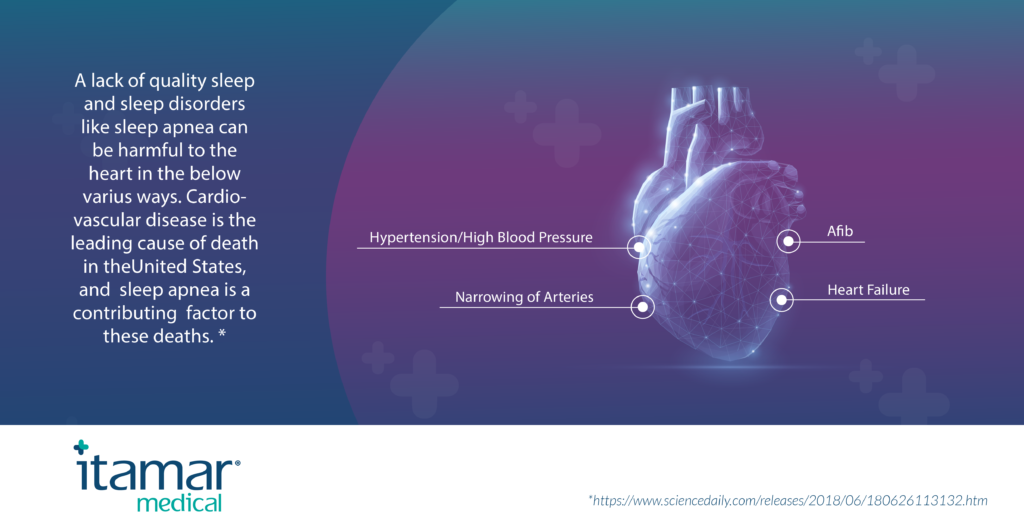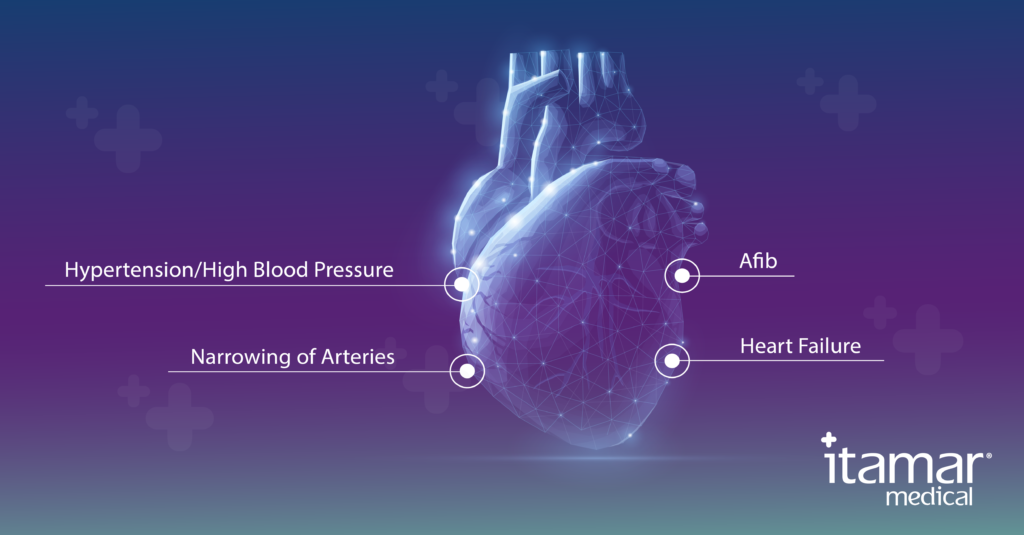
March hosts both National Sleep Awareness Week and National Sleep Day. Therefore, it is appropriate to explore the connection between sleep and heart health. In our article, “Can Sleep Disorders Lead to Hypertension?”, we examined the relationship between sleep disorders and hypertension and how important it is to discuss sleep with your patients and conduct sleep screenings. We know that a lack of proper sleep, especially caused by sleep disorders like sleep apnea, is linked to poor heart health.

As seen in figure 1 above , a lack of quality sleep can be harmful to the heart in various ways, and as cardiovascular disease is the leading cause of death in the United States, clinicians are constantly treating patients for heart conditions and unraveling risk factors that can lead to heart disease. With atrial fibrillation (AF) being the most common arrhythmia diagnosed in clinical practice, it is important that we thoroughly analyze the factors that can lead to its occurrence. One relevant factor that we have found to be associated is atrial fibrillation.
The Relationship Between Sleep and Atrial Fibrillation
Sleep itself is a vital component of life, and although sleep apnea has been linked to heart conditions like AF, a lack of adequate sleep, independent from sleep disorders, can also lead to issues. A study that analyzed participants from various heart studies found that sleep quality itself, independent of sleep apnea, was a determinant of AF, with less REM sleep and sleep disturbances being highlighted risks.1 However, with millions of people suffering from sleep disorders, diagnosing and treating such disorders can also be the gateway to improving sleep and decreasing the chance for AF. Sleep apnea, in particular, has been revealed to be a major risk factor for AF.
Sleep Apnea and Atrial Fibrillation
Experimental data and epidemiologic studies show both central and obstructive sleep apnea are associated with atrial fibrillation.2 Studies, such as the Sleep Heart Study and the Outcomes of Sleep Disorders in Older Men Study, have found a two to fivefold increased chance of AF for those with a moderate to severe degree of sleep-disordered breathing.2 Furthermore, in examining the etiology behind sleep apnea and AF, experiments with animals have been conducted. In one experiment, obstructive sleep apnea was mimicked in rats using a mechanical ventilator. It was found that the rats with chronically repeated episodes of obstructive sleep apnea exhibited characteristics such as AF-promoting cardiac remodeling, atrial conduction slowing, and increased atrial fibrous tissue content.3 Similar characteristics have been found in human subjects with obstructive sleep apnea as well, with studies showing AF-promoting cardiac remodeling characterized by changes like atrial enlargement and a reduction in cardiac voltage.4, 5
In light of the findings mentioned above, there are studies that show that treating sleep apnea decreases AF recurrence. In a study by Abe et al. consisting of 1300 patients with obstructive sleep apnea-hypopnea syndrome (OSAHS), it was found that continuous positive airway pressure (CPAP) treatment significantly reduced episodes of paroxysmal AF in patients with moderate to severe OSAHS.6 In another study, Kanagala et al. further investigated the effect of CPAP treatment for OSAHS patients with AF and found an 82% increased chance of AF recurrence in the patients who did not receive CPAP compared to the 42% chance of recurrence when CPAP therapy was administered.7 With further studies continuing to validate sleep apnea as a notable risk factor for AF, the importance of incorporating sleep apnea screening in your practice can be the key to treating patients with AF.
The WatchPAT® TurnKey Program: A Sleep Apnea Management Solution for Your Practice
Undoubtedly, quality of sleep is an essential factor to assess when consulting patients. As a cardiologist, an effective yet efficient screening method for sleep apnea can be the difference-maker in a diagnosis and treatment plan. Whether patients are dealing with AF or other conditions, you want to ensure that sleep apnea does not go unnoticed, as up to 80% of moderate and severe cases are.8 This is the reason why we provide clinicians the WatchPAT® TurnKey Program. The program is a seamless solution that ensures cardiovascular patients with sleep apnea are diagnosed and can be brought to a treatment plan in less than two weeks on average.
Contact us today to learn more about our TurnKey Program and how WatchPAT® provides sleep screening solutions for your practice.
References:
- Poor sleep quality linked to atrial fibrillation. ScienceDaily. https://www.sciencedaily.com/releases/2018/06/180626113132.htm. Published June 26, 2018. Accessed March 2, 2021.
- Ayache MB, Mehra R, Mayuga KA. Should I Evaluate My Patient With Atrial Fibrillation for Sleep Apnea? Consult QD. https://consultqd.clevelandclinic.org/should-i-evaluate-my-patient-with-atrial-fibrillation-for-sleep-apnea/. Published March 9, 2020. Accessed March 2, 2021.
- Iwasaki YK, Kato T, Xiong F, et al. Atrial fibrillation promotion with long-term repetitive obstructive sleep apnea in a rat model. J Am Coll Cardiol. 2014;64(19):2013-2023. doi:10.1016/j.jacc.2014.05.077
- Dimitri H, Ng M, Brooks AG, et al. Atrial remodeling in obstructive sleep apnea: implications for atrial fibrillation. Heart Rhythm. 2012;9(3):321-327. doi:10.1016/j.hrthm.2011.10.017
- Müller P, Grabowski C, Schiedat F, et al. Reverse Remodelling of the Atria After Treatment of Obstructive Sleep Apnoea with Continuous Positive Airway Pressure: Evidence from Electro-mechanical and Endocrine Markers. Heart Lung Circ. 2016;25(1):53-60. doi:10.1016/j.hlc.2015.05.004
- H. Abe, M. Takahashi, H. Yaegashi, S. Eda, H. Tsunemoto, M. Kamikozawa, et al. Efficacy of continuous positive airway pressure on arrhythmias in obstructive sleep apnea patients.
- R. Kanagala, N.S. Murali, P.A. Friedman, N.M. Ammash, B.J. Gersh, K.V. Ballman, et al.Obstructive sleep apnea and the recurrence of atrial fibrillation. Circulation, 107 (2003), pp. 2589-2594
- Heart Vessels, 25 (2010), pp. 63-69Lee W, Nagubadi S, Kryger MH, Mokhlesi B. Epidemiology of Obstructive Sleep Apnea: a Population-based Perspective. Expert Rev Respir Med. 2008;2(3):349-364. doi:10.1586/17476348.2.3.349
